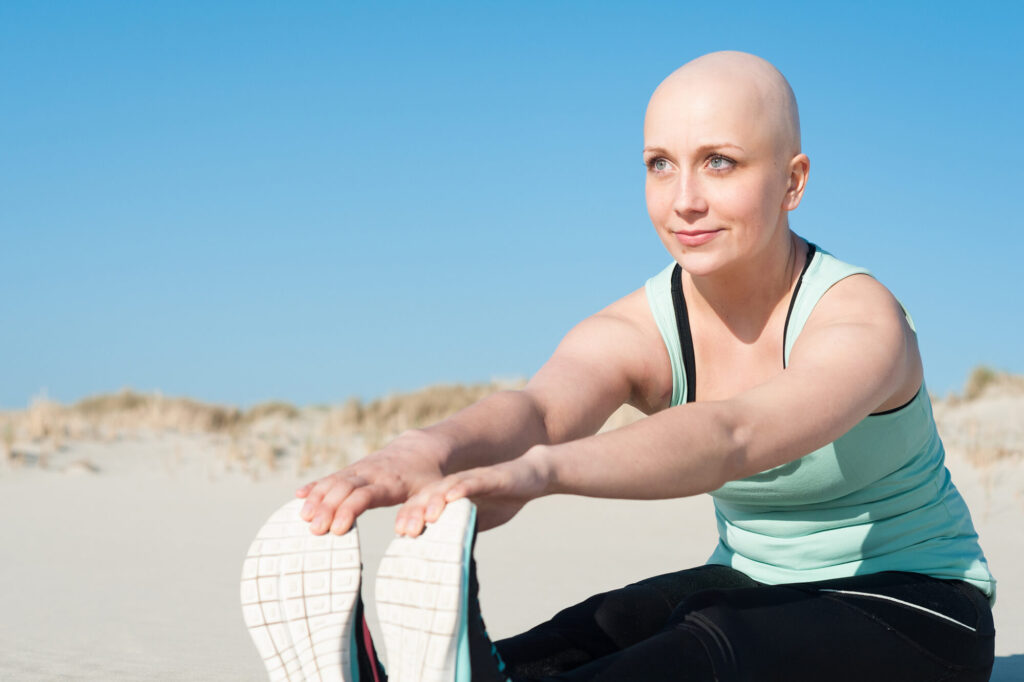Let’s talk about something big. Not just calories burned or strength gained—something much more life-changing: cancer.
As a certified personal trainer and nutritionist, I get asked all the time:
“Does exercise really help fight cancer?”
The short answer? Yes, it absolutely can.
But before we dive in, I need to be clear:
I am not a medical doctor.
I don’t diagnose, treat, or prescribe. What I offer here is based on my working knowledge of anatomy and physiology, my 25+ years of experience in the health and fitness industry, and a whole lot of scientific research.
My mission is to help you understand how movement, nutrition, and lifestyle can support your body and your life—so you can dig deeper and do your own research, ask the right questions, and advocate for your own health.
Now that we’ve got that straight—let’s get into it.
What the Research Says: Can Exercise Help Fight Cancer?
Yes. Studies show that regular physical activity can directly reduce the risk of developing certain cancers, and it can also help those undergoing cancer treatment feel better, recover faster, and live longer.
Some of the strongest evidence links regular exercise to lower risk of:
- Breast cancer
- Colon cancer
- Endometrial cancer
- Lung cancer
- Kidney and bladder cancers
So how does movement make such a difference?
The Real Impact of Exercise on Cancer (and the Body)
1. It Regulates Hormones
Too much circulating insulin or estrogen can increase the risk of some cancers. Exercise helps regulate these hormones naturally by improving insulin sensitivity and balancing metabolic function.
2. It Strengthens the Immune System
When you move your body, you boost the activity of your natural killer cells, T-cells, and macrophages—the very cells that recognize and destroy abnormal or cancerous cells.
You also improve lymph flow, which helps clear out toxins and cellular waste.
3. It Reduces Inflammation
Chronic inflammation plays a role in the development and progression of many types of cancer. Exercise reduces inflammation markers in the body and helps shift your internal environment toward healing.
4. It Improves Treatment Tolerance
Chemo and radiation are rough. There’s no sugarcoating that. But regular movement can reduce common side effects like:
- Fatigue
- Nausea
- Muscle wasting
- Brain fog
- Depression and anxiety
Exercise also helps maintain strength and mobility, which becomes especially important during long or aggressive treatments.
5. It Boosts Mental Resilience
Here’s something often overlooked: the emotional and mental battle of cancer. Movement—especially walking, light resistance training, or yoga—gives you a sense of control and routine when things feel upside down. It boosts your mood, helps you sleep better, and can even help you stay hopeful.
How Much Exercise is Enough?
According to guidelines from the American Cancer Society and American College of Sports Medicine, cancer survivors and people in treatment should aim for:
- 150 minutes per week of moderate-intensity aerobic activity (like brisk walking or cycling)
- 2 to 3 strength-training sessions per week
- Daily flexibility and balance work (especially helpful during recovery or fatigue)
But here’s my personal trainer take:
Start small. Start where you are. But start.
If that means five minutes of walking, great. If it means stretching in bed or doing chair exercises, fantastic. Consistency over time is where the power lies—not perfection.
Real Talk: Movement is a Tool, Not a Cure
Exercise is not a cure for cancer. It is not a replacement for medical treatment.
But it is one of the most powerful tools we have to:
- Prevent certain cancers
- Support your body during treatment
- Recover more fully afterward
- Thrive physically and mentally, regardless of your health status
I’ve worked with clients who kept moving through radiation. I’ve helped survivors regain their strength after surgery. I’ve coached people who were just trying to reclaim their energy after chemo. And I’ve seen firsthand what even a small dose of daily movement can do.
My Personal Recommendation
If you or someone you love is dealing with cancer, talk to your doctor about integrating movement into your care plan. Then work with someone who understands both exercise physiology and the lived reality of fatigue, pain, or post-treatment recovery.
Here’s what to look for:
- A certified trainer with experience working with medical conditions
- Gentle, progressive programming
- Empathy, flexibility, and a focus on how you feel—not just the numbers
Even just a daily walk or a few deep stretches in the morning can light a spark and help you feel like you again.
Final Thoughts: Your Body is Worth Fighting For
Cancer is a word no one wants to hear. But if it enters your story, know this:
Movement is still medicine.
Not every day will feel good. Some days, doing nothing will be the right call. But over time, if you keep showing up for your body with love, patience, and intention, you’ll feel the difference—in your strength, in your energy, and in your mindset.
You’re not powerless. Even when life throws its hardest punches, movement can help you stay in the fight.
Resources for Further Reading
Here are the sources I used and recommend for anyone who wants to dig deeper:
- American Cancer Society
https://www.cancer.org - American College of Sports Medicine
Exercise Guidelines for Cancer Survivors
https://www.acsm.org - Schmitz KH, et al. Exercise Guidelines for Cancer Survivors.
Med Sci Sports Exerc. 2019;51(11):2375–2390.
https://pubmed.ncbi.nlm.nih.gov/31626055 - National Cancer Institute: Physical Activity and Cancer
https://www.cancer.gov/about-cancer/causes-prevention/risk/obesity/physical-activity-fact-sheet
Your Challenge:
Pick one small way to move today—walk the dog, stretch before bed, do 5 air squats in the kitchen. Doesn’t matter how big or small. Your body deserves that care, and so do you.
Let me know how you’re moving today—I’m always here to cheer you on.
— Coach Chris
Health Coach, Certified Personal Trainer, & Nutritionist
Legion Fitness | @coachchris_legionfitness

